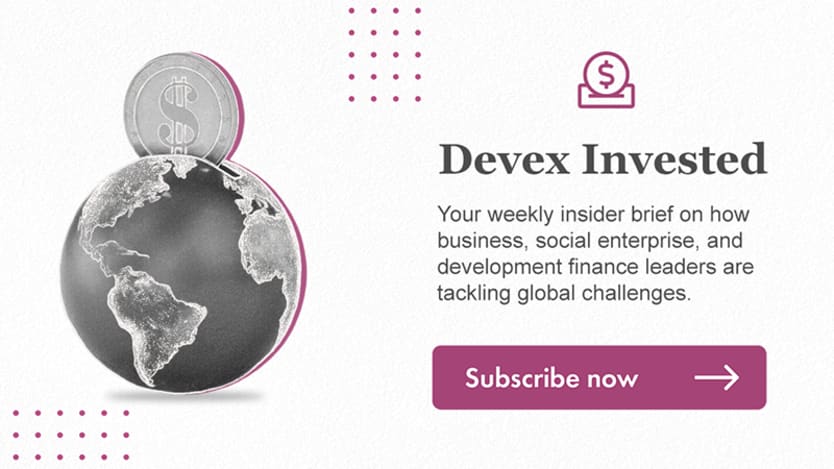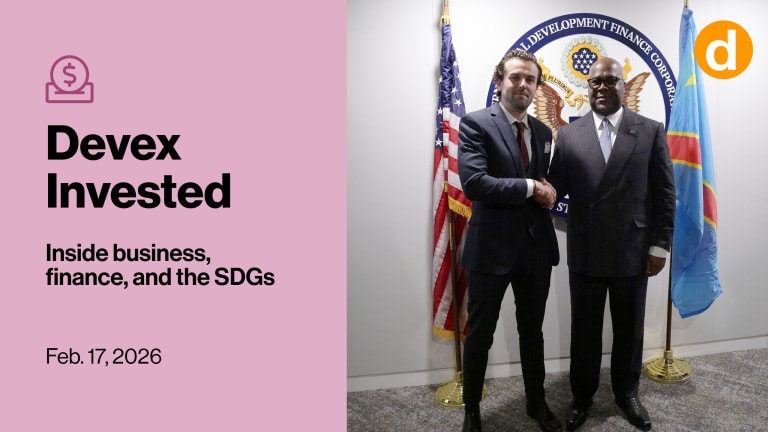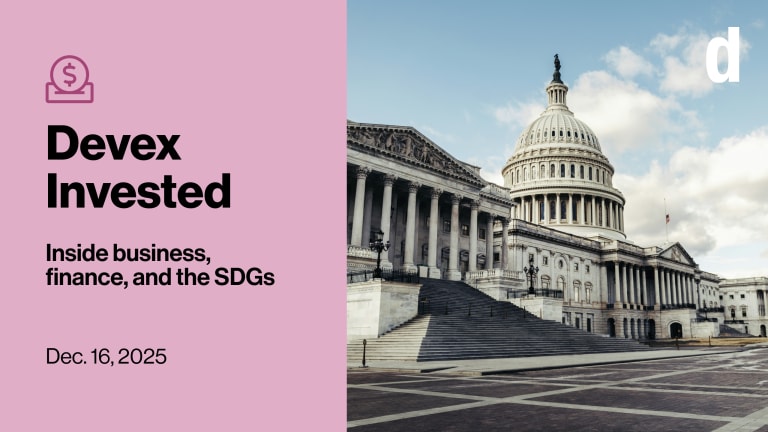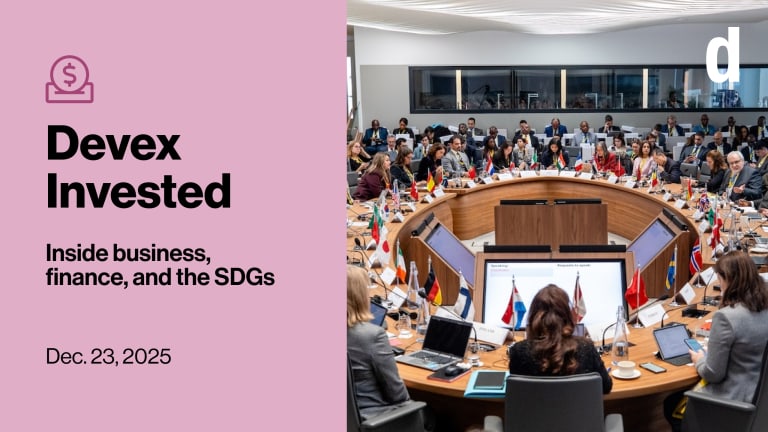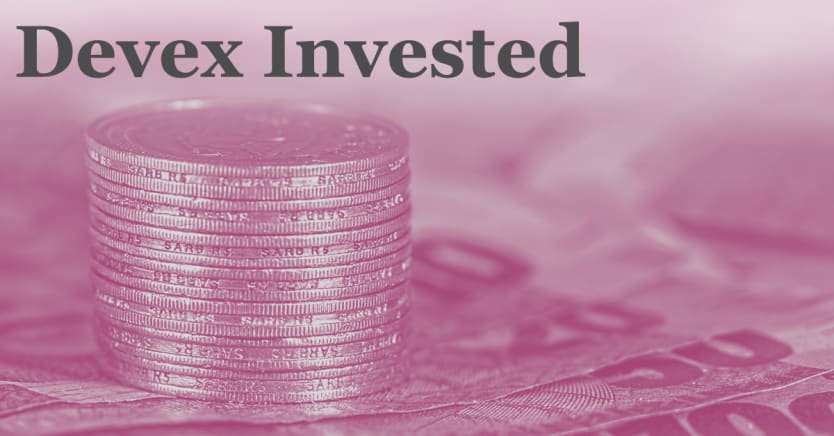
The U.S. International Development Finance Corporation’s investments in solar have hit a major roadblock: Key components in solar panels — principally polysilicon — are allegedly manufactured using the forced labor of the Uyghur population in China’s northwestern Xinjiang region.
This is a preview of Devex Invested
Sign up to this weekly newsletter inside business, finance, and the SDGs, in your inbox every Tuesday.
The agency froze its pipeline of potential solar projects, unable to proceed until it figured out a new policy to avoid supporting forced labor — losing out on nearly $1 billion worth of potential investments.
• DFC has a two-pronged approach to the challenge: It’s tweaking contract language to stop borrowers from buying from companies tied to forced labor, and it’s developing certifications and improved traceability in the supply chain. But it’s a work in progress, and traceability efforts could take years, a DFC official tells me.
• The agency is “getting squeezed” as climate directives limit oil and gas investments, and human rights concerns restrict solar investments, experts tell me. Now, DFC must find a way to stay relevant in solar in a way that doesn’t have connections to Chinese supply chains.
• That’s not the only setback for the young agency. When the White House sent an emergency funding request for Ukraine to lawmakers last month, it sought to expand the countries that DFC could work with to include high-income nations affected by the war. Some worried the change would undermine DFC’s development mandate and divert funding from lower-income countries. While the proposal didn’t make it into the $40 billion bill — which is now under consideration by the Senate — it points to continued pressure on the agency and its mission.
Read more: DFC faces China forced-labor challenges with solar investments
ICYMI: US House rejects proposal to expand DFC focus, passes Ukraine funding
Join us
This week, the U.K. government finally released its new international development strategy. For a deeper look, Devex Pro subscribers are invited to join U.K. Correspondent William Worley and a panel of experts for a special event on Friday, May 20. If you're not a Pro subscriber yet, you can sign up for a free trial to join.
Read Will’s reports on the new development strategy’s aim to put “economic power at the centre,” and experts’ reactions, including criticism of the strategy’s “aid for trade” approach.
+ Check out our page dedicated to U.K. aid.
Yellow light
It took years of careful choreography to get sometimes reluctant shareholders to approve — in principle, at least — the European Bank for Reconstruction and Development’s plans to lend in sub-Saharan Africa, my colleague Vince Chadwick reports. At last week’s annual meeting in Morocco, they approved a resolution that “backed in principle the Bank’s proposed expansion of activities into sub-Saharan Africa and Iraq,” according to a press release.
But EBRD President Odile Renaud-Basso told journalists last week that “this does not mean that we will be starting activities there yet. Further steps will be needed.”
So is that a green light or not? It seems far from a done deal, as shareholders reserve the right to see how the situation in Ukraine unfolds.
ICYMI: EU predicts ‘discussion’ on suspending Russia from EBRD
Faith in the markets?
69%
—That’s the percentage of faith-based asset owners surveyed by FaithInvest who clearly stated the role of faith in the principles and guidelines that govern their financial assets. But fewer than half of the investment policy and guideline statements described faith values as being “integrated” across all assets, Rebecca L. Root reports for Devex.
Read: What faith groups' move toward value-based investing means for NGOs
+ Sign up to Faith and Development, our free monthly newsletter that focuses on the role faith groups and their communities play in strengthening global development outcomes.
Stop order
A key U.S. diplomat has recommended that Washington halt all new funding to the United Nations Office for Project Services amid internal U.N. investigations into its financial practices and management, my colleague Shabtai Gold reports.
Chris Lu, the U.S. ambassador to the U.N. for management and reform, had been asking questions about UNOPS’ funding practices for months before Devex broke the story in April of potential mismanagement and corruption at the agency — particularly within its impact-investing initiative. A U.N. investigative report has been completed but has not yet been released.
Read more: US official recommends halting funding to UNOPS amid financial probe
Recap: What went wrong with UNOPS’ ambitious impact-investing initiative?
Tracking AfDB funding
In 2021, the African Development Bank allocated more than $5 billion to nearly 100 new projects, pending final approvals. My colleague Miguel Antonio Tamonan has an analysis on where those funds are going. Two-thirds of the new funding will go to West Africa, but among the regions where the bank invests, North Africa and the Middle East appear to have the biggest annual increase. Agriculture and rural development had the greatest allocations of any sector.
Read: AfDB allocated over $5B in 2021. Here’s where it’s going (Pro)
+ With a Pro Funding subscription, track over 600,000 sources of global development funding news. You can use it to find information on key partners, set up custom alerts, and access analysis of funding trends. Start your five-day free trial now.
What we’re reading
World Bank’s remittances to low- and middle-income countries to rise this year, but Ukraine war poses disruptions. [Devex]
Namibia forms wealth fund to weather economic shocks. [Bloomberg]
Tobacco control advocates challenge industry greenwashing. [Devex]
World Vision UK’s income slashed by ‘brutal’ FCDO aid cuts. [Devex Pro]
Vince Chadwick contributed to this edition of Invested.
